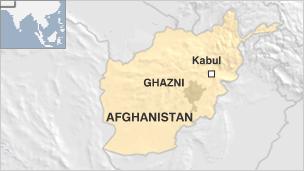Weeping Karzai laments Afghan woes
- Published
Hamid Karzai: "I swear I feel the pain"
President Hamid Karzai has broken down in tears during a speech at a high school, as he lamented the problems plaguing Afghanistan.
In a nationally televised address to teachers and pupils in central Kabul, Mr Karzai said he feared the war might make his young son leave his homeland.
He later named the members of a special council whose task is to start formal negotiations with Taliban insurgents.
Afghanistan is facing its bloodiest year since the US-led invasion of 2001.
Mr Karzai's speech on Tuesday aimed to promote education in a country whose literacy rate is about 30%.
The president began crying as he said he wanted Afghans to get an education and be self-sufficient.
"Our sons cannot go to school because of bombs and suicide attacks. Our teachers cannot go to school because of clashes and threats of assassination. Schools are closed," he said.
Referring to his three-year-old son, he added: "I want him to go to school here, I swear to God I'm worried, I'm worried, oh people, I'm worried. God forbid Mirwais should be forced to leave Afghanistan."
TV coverage of the speech to hundreds of teachers, students and officials showed some members of the audience were also crying.
The address comes days after a new book by renowned US journalist Bob Woodward cited intelligence that said the Afghan president had been diagnosed with manic depression and was on medication.
Mr Karzai's office said the claims in the book, Obama's Wars, were "highly inflammatory".
Later on Tuesday, Mr Karzai established a peace council tasked with starting formal talks with the Taliban to end the insurgency.
The Afghan president's High Council for Peace - whose creation was announced in June at a Kabul peace conference - is to be made up of about 70 members, including women.
But the BBC's Ian Pannell in the Afghan capital says some of the members are former warlords who spent years fighting the Taliban.
And that may hamper efforts to do the very thing the president is crying out for: bringing an end to the war, adds our correspondent.
Human Rights Watch analyst Rachel Reid said: "Many of these men are unlikely peacemakers. There are too many names here that Afghans will associate with war crimes, warlordism and corruption."
Earlier on Tuesday, a suicide bomber on a motorised rickshaw killed Ghazni province's deputy governor, Mohammad Kazim Allahyar, as he drove to work.
His son, nephew, a bodyguard and two civilians also died, and eight other people were seriously injured.

The Nato commander in Afghanistan, Gen David Petraeus, said meanwhile that a number of insurgents had approached the Afghan government and foreign forces about laying down arms.
But our correspondent says the numbers involved are thought to be small at this time.
He says the bigger picture is of an insurgency fighting to the death in Helmand and Kandahar and expanding in places like Ghazni and Kunduz, and a Taliban leadership that publicly shuns the idea of direct talks with the government.
There are more than 150,000 Nato troops in Afghanistan trying to defeat the insurgency ahead of a scaling down of US troops in the country expected to start next year.